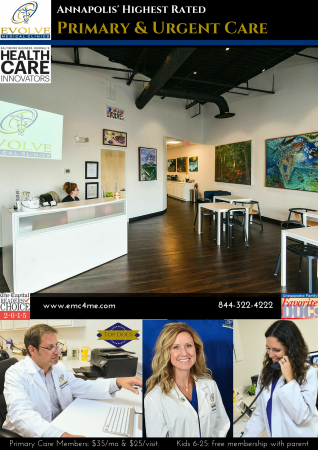Governor Hogan has declared a State of Emergency for Maryland “out of an abundance of caution” in advance of Hurricane Joaquin. Evolve Medical would like to provide you with the basics of hurricane preparation.
If Hurricane Joaquin, or any other hurricane, were to hit Annapolis and Anne Arundel County the way that Sandy hit parts of New York, you will want supplies to keep your family safe and healthy.
Keep in mind that hurricanes often result in power loss and interruption of water supply. Many homes in Annapolis use well water and remember–those wells require electricity to work! Roads may be
flooded or blocked and your car may be damaged or trapped. The CDC strongly advises that it is best to be prepared.
What do you need? We’ve compiled a list based on the CDC, Anne Arundel County Office of Emergency Management and other websites.
The CDC‘s checklist is duplicated below. We’ve also highlighted the absolute most essential items (for instance, you can go without food for 3-5 days but you can’t survive without water).
Food and Medicine
- Clean containers for water
- At least 5 gallons of water per person (which should be enough to last 3 to 5 days) (or another calculation: 1 gallon per person per day)
- 3 to 5 days supply of food that doesn’t go bad (like canned food/peanut butter/etc)–and a CAN OPENER
- Baby food or formula
- Prescription medicines
Safety Items
- First aid kit and instructions
- Fire extinguisher
- Battery-powered radio
- Flashlights
- Extra batteries
- Sleeping bags or extra blankets: Important to stay warm!
- Supplies to make drinking water safe (like iodine tablets or chlorine bleach)
- ***Back up power to charge your cell phone: ability to receive information and communicate is a critical necessity
- Plastic sheeting and duct tape for shelter
- Tools like wrench and pliers to turn of utilities if necessary
- Whistle to signal for help
Personal Care Products
- Hand sanitizer
- Wet cleaning cloths (like baby wipes)
- Soap
- Toothpaste
- Tampons and pads
- Diapers
Make sure your supplies are stored together in a place that’s easy to reach.
Make an Emergency Car Kit
In case you need to leave quickly during a hurricane, always keep an emergency kit in your car, too. Your Car/Travel kit should include:
- Food that doesn’t go bad (like canned food)
- Flares
- Jumper cables (sometimes called booster cables)
- Maps
- Tools, like a roadside emergency kit
- A first aid kit and instructions
- A fire extinguisher
- Sleeping bags
- Flashlight and extra batteries
- Having a GPS — either in your car or on your smartphone — can help during an emergency too.
Visit Ready.gov for more information on emergency plans and supply kits.
Basic Preparedness Tips
- If there is a call for evacuation, know the local hurricane evacuation route(s) to take and have a plan for where you can stay. City of Annapolis’ OEM page
- Put together a disaster supply kit (see above)
- If you are not in an area that is advised to evacuate and you decide to stay in your home, plan for adequate supplies in case you lose power and water for several days and you are not able to leave due to flooding or blocked roads.
- Make a family emergency communication plan.
- Many communities have text or email alerting systems for emergency notifications. In Anne Arundel County Office of Emergency Management maintains a Facebook page: Like it!
Preparing Your Home
- Hurricane winds can cause trees and branches to fall, so before hurricane season trim or remove damaged trees and limbs to keep you and your property safe.
- Secure loose rain gutters and downspouts and clear any clogged areas or debris to prevent water damage to your property.
- Reduce property damage by retrofitting to secure and reinforce the roof, windows and doors, including the garage doors.
 Purchase a portable generator or install a generator for use during power outages. Remember to keep generators and other alternate power/heat sources outside, at least 20 feet away from windows and doors and protected from moisture; and NEVER try to power the house wiring by plugging a generator into a wall outlet.
Purchase a portable generator or install a generator for use during power outages. Remember to keep generators and other alternate power/heat sources outside, at least 20 feet away from windows and doors and protected from moisture; and NEVER try to power the house wiring by plugging a generator into a wall outlet.- Consider building a FEMA safe room or ICC 500 storm shelter designed for protection from high-winds and in locations above flooding levels.
We hope this helps. Evolve Medical Clinics will remain open throughout the duration of the storm and we will be available by phone: 844-322-4222. You can text our number or call. You can also email [email protected] with questions.










































